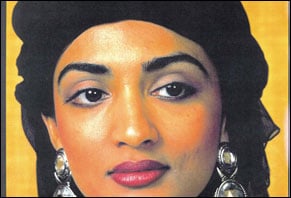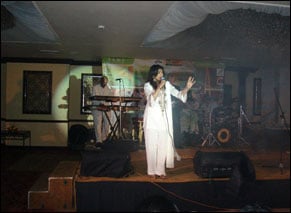|
|
| |
instep profile
Pakistan's non-resident nightingale
You may not know Najma Akhtar but here's why you should. How
many Pakistanis can claim to have collaborated with Jethro Tull
and sung with Robert Plant?
By Shahzeb Shaikh
|
| |
Though Najma Akhtar
is not well recognized in Pakistan, she carries a strong musical history.
She is labeled as the pioneer of a genre known as 'Fusion of Jazz
& Indian Ghazal'. On her first visit to Pakistan with her band
comprising of UK artists for an international conference organized
by the Salim Akhtar Memorial Foundation (SAMF) as part of the Women's
Day celebrations recently, she lent Instep some time out of her busy
schedule.
Born and brought up in a business family in England and although a
graduate in Chemical Engineering, Najma has proved to be a successful
and versatile artist. Funnily enough, she actually studied a totally
different discipline. |
 |
| |
"I did chemical
engineering because at that time my father was thinking of moving
to Pakistan and putting up a polyethylene plastic plant so I thought
it would be interesting to be involved in the field. Music kind of
came in during the course of my degree and it was purely a hobby.
"My musical journey started with the inspiration from two wonderful
and talented musicians from Pakistan. One was Parvez Mehdi and the
other was Abdul Sattar Tari, the tabla player. The first time I saw
the tabla and harmonium was at a musical evening at a friend's college.
I was mesmerised by the chemistry between these two wonderful artists.
My first harmonium was a 2nd hand one, which my dad got for me miles
away from my place and the first song I played was 'Ayegi Ayegi Kisi
Ko Humari Yaad Ayegi' after listening to the tape. I was so excited
about it, I remember," she cherishes the memories. |
| |
| "I met Parvez and Tari and
I invited them for dinner and then they invited my family to their
concerts. They taught me a ghazal which was actually recorded for
BBC eventually. I didn't know how to sing at all at that time. Then
I met another Pakistani singer, Rajab Ali, who had come to UK. He
saw me singing at a concert and he said to my parents that this girl
should learn. He introduced us to Ustad Naeem Solaria who lived in
East London," says Najma about how she started walking the road
that seems to have become her destiny. |
 |
| |
She has sung in many
different languages such as Urdu, Punjabi, Gujrati, Bengali, French
and of course English. She has 6 albums under her belt to date. Qareeb
was her debut album which was groundbreaking and it took her all the
way across the world. It was her first performance with the musicians.
"My band was quite an international group; the saxophone player
was from Caribbean, the keyboard player was English, the tabla player
was from Africa and my violin player Nawazish Ali Khan was from Pakistan,"
informs Najma. This album took her to the Glastonbury Festival, one
of the most well renowned musical events of the world apart from being
the most cutting edge music festival in the UK.
"My parents didn't allow me to go to the festival till my producers
convinced them and my parents came with me. I performed 3 songs along
with my musicians and the crowd wanted more but I didn't have more,"
Najma shares the memory of the memorable event with an excited laugh. |
| |
Najma has collaborated with one
of the leading artists/ bands of the world, the likes of Andy Summers
on his album The Golden Wire, Steve Coleman on his album Black Science,
Ken Morioka on his album in Japan titled Question, Apache Indian on
his hit single titled 'Arranged Marriage', Jethro Tull on the title
track from the album J-Tull Dot Com, Jah Wobble on his album Take
Me To God, Jimmy Page and Robert Plant (both formerly of Led Zeppelin)
on the track 'The Battle of Evermore' from their album No Quarter:
Jimmy Page and Robert Plant Unledded, and many more.
|
 |
| |
"I
was doing collaboration with a band in States on a remix of R.D. Burman's
track when my brother called from London saying that Robert Plant's
management company had contacted him and Robert wanted to collaborate
with Najma. All the members congratulated me and it was a great feeling,"
Najma shares the history of a breathtaking collaboration with the
two remaining icons of the classic rock band Led Zeppelin. She believes
that collaborations help an artist to grow for confidence and polish
his/her talents further more.
Najma excels at playing harmonium while she makes a band which goes
under her name along with some talented musicians namely Hinal Pattani
(Keyboards and back vocals), Dharmesh Makwana (Drum), John Deemar
(Bass Guitar), Sirish Kumar (Tabla), Gerry Hunt (Saxophone and flute).
"I formed the band in late '80s and John Deemar has been with
me for the longest and through thick and thin," she says.
Najma is not at all recognized in Pakistan and this stems from the
fact that she hasn't done any video, album or a proper bhangra, pop
number, which is an essential part of making an entry into the limelight.
Desi music has been making rounds in UK for a very long time. How
does she see the desi music scene recently? "Desi music scene
has gone through a huge change. When I started singing, I was impressed
by ghazal. After I released my first album, bhangra music had started
to evolve with many bands such Alaap, Heera etc and most of these
people had come from Africa. Then in '90s Bally Sagoo came in with
his remixes. Also there was a non-commercial scene which involved
me, Nitin Sawnhey etc. The scene has developed a lot because now you
have got R 'n' B, reggae, rap and the situation in America is also
the same. However there are only 1 or two female singers in the scene
such as Veronica etc. It's definitely thriving which is quite good,"
replies Najma.
Her views on Pakistani music scene are, "To be quite frank, I
am very much impressed with talent of Pakistani musicians. There is
so much talent that even Indian people are copying the Pakistani artists.
I am very proud that Pakistani youth is so talented not just in music
but in media as well. But most of the bands are rock oriented. I remember
listening to Aaroh, they are very nice."
She defines her music as a fusion of Eastern and Western influences,
jazz based. It is definitely an honor to be labeled as the pioneer
of a genre. Her expressions are, "It is absolutely wonderful.
Sohail Hashmi came the other day and said 'Najma I am going to interview
you. You have done so much for music and you have been singing way
before many artists and no body knows about it.'"
A singer who has been associated with music for nearly two decades
believes that she has evolved as an artist. Her thoughts are, "I
have evolved by seeing and doing as a musician, by meeting people,
being brave and experimenting. The first time I met Andy Summer, I
thought how I can possibly sing a Lata Mangeshkar song? In fact it
didn't come out to be good when I recorded it in his studio. But the
demo I sent him from London was 10 times better than I had sung earlier.
I remained positive and I recorded it eventually. It was a challenge
for me and I believe life is all about challenges. My music is also
my challenge. Now I am challenging myself even more."
Her sister Salma Abbasi is the chairperson of SAMF (Salim Akhtar Memorial
Foundation) which is involved in service of mankind through charity.
Najma was here in Pakistan through that organization.
Najma likes to play tennis, running and watching movies. She keeps
music right at the fore front of her life. She calls herself a British
born Asian and loves the Pakistani culture. She gives credit to her
parents for her wonderful upbringing.
Najma plans to do establish herself in Pakistan and few projects are
in the pipeline. "My projects in Pakistan would be more subtle
and not so boom boom."
Her message for fans is, "Be accepting. Learn to appreciate and
if you want to make music, then you must practice because it doesn't
come over night. Dedication is the name of the game." |
| |
| |
|

